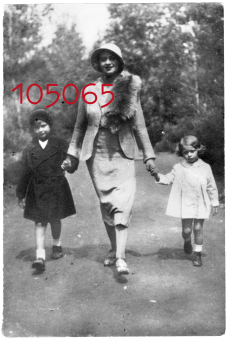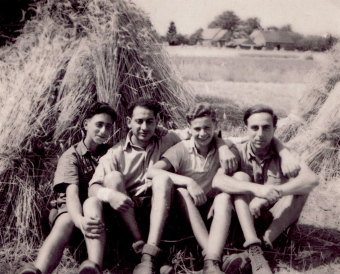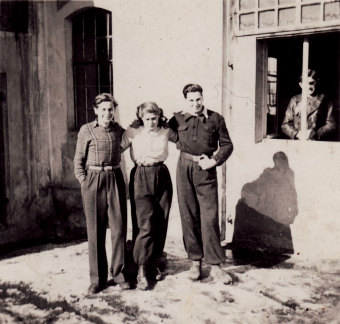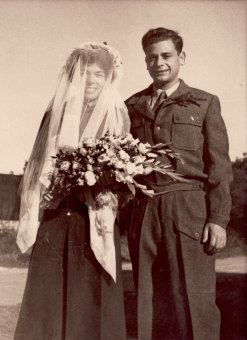a “Our first days working in the concrete detachment consisted of shoveling gravel into mining carts and then having to push these carts to the place where the gravel was mixed with sand, cement, and water to make concrete. At first, five or six of us could get these carts rolling. After only a few days, however, it took ten or twelve men to accomplish that. That’s how fast we lost strength on this diet. Of course, contributing factors here were also the long working hours and the brutal treatment.”
(Peter Wolff: Ein Überleben. Ein deutscher Jude im 20. Jahrhundert (Saarbrücken: Conte, 2008), p. 61. (Transl. KL))
b “A hitherto totally unknown environment with an unaccustomed climate and, of course, completely strange people. I was already looking forward to the reunion with my mother and sister and wondering how this would come off. I didn’t know how and where I would find accommodations, but I could imagine sunbathing on the sand and swimming in the sea. I had no money, barely any clothing—which didn’t fit in here either—and no idea of the future. I didn’t believe that ordinarily there could be a young man of 20 with no idea at all of what he must, could, or should do next. At this age, one either has finished an apprenticeship or is in the midst of university studies. In any event, however, one has spent the past years dealing with one’s education or one’s career. Ordinarily, however, one also has had constant contact with family and peers. In short: one has been and is engaged in living. I was not at all engaged in living. I had been forcibly deprived of my family, education, career, and normal contact with people in normal life. I had lost not only my youth but also my normal years of development. I lacked knowledge of current general educational literature, of political and geographic developments, and naturally of the state of technology in many areas. Thus I had a great deal to catch up on, but above all to make up for, too. But it was not only a matter of education. The social sphere, too, is not something that can be forced. Dealing with people, the behavior appropriate in each case, mixing with others, making new acquaintances and building a circle of friends—not to mention friendships—all that had to be tackled. And all that in a country whose language I hadn’t yet mastered. I still had a lot to learn.”
(Peter Wolff: Ein Überleben. Ein deutscher Jude im 20. Jahrhundert (Saarbrücken: Conte, 2008), pp. 109–110. (Transl. KL) )
“The past can never be ‘gotten over’—as the nice expression goes. It can be neither changed nor undone. But you have to keep grappling with it, because for everyone—even after all these years—it has remained incomprehensible.”[1]
Peter Wolff was born in Berlin on September 7, 1924, the son of advanced medical student Leo Wolff and his wife, Helene. After the couple separated, Helene remarried, and Peter’s sister, Anita Borger, was born in 1928. The family soon moved to Katowice, where the grandfather owned a cabinetmaker’s workshop. The photo of Peter, Anita, and their mother was taken there. Peter Wolff first attended the German school, and then the Polish one, starting in 1933. There were three Jewish boys in his class, and occasionally there were scuffles with the Christian boys. In addition to school, Peter helped his grandfather or went on outings with the Zionist Youth.
Leo Wolff had emigrated to Palestine in 1937. Shortly before the outbreak of war, Helene Borger fled with Anita and Peter to Warsaw, but the Germans caught up with them. They claimed to be Germans and, disguised as “Volksdeutsche” (ethnic Germans living outside of the Reich), made their way to Berlin. From here, Helene and Anita Borger managed to emigrate to Palestine, passing through Istanbul on the way. Peter Wolff, who was scheduled to emigrate through the Youth Aliyah program, went to Schniebinchen, to a Hachshara camp, but emigration was no longer a possibility. In 1941, when Hachshara was banned, the young people first were moved to a labor camp at Paderborn and then deported to Auschwitz in March 1943.
There the young men and women were separated, and most of the men went to the Buna/Monowitz concentration camp. After three months of hard labor and nasty bullying at the I.G. Farben construction site, with completely inadequate food rations a , Peter Wolff volunteered to work as a “welder for superstructure work who was not subject to dizziness.” Once he was able to write a card to his mother. Because he was blamed for stealing, he was transferred to the Janinagrube subcamp to do forced labor as a coal miner. Seven months later, he returned to the Buna/Monowitz concentration camp. He survived the death march in January 1945, despite a wound caused when a gunshot penetrated his upper arm. In the Mittelbau-Dora concentration camp, he dug himself out of the ruins of the barracks after an airstrike and escaped with his friend Ernst Lobethal. On April 2, 1945, they were liberated by the U.S. Army.
Peter Wolff went along with the repatriated French POWs on their journey to Paris. His goal was to join his mother in Palestine, and he reached Haifa in July 1945. b Here he worked as an electrician. In 1946, in Netanya, he met his future wife, Susanne. The couple had a son and a daughter. Peter Wolff fought in Israel’s War of Independence. Wanting to continue his studies, Peter Wolff returned to Germany with his family in 1957: first he found a job with AEG, a major German electrical company, and finished his degree in electrical engineering in Esslingen. At 39, he was the oldest student there. Then the family settled in Neu-Isenburg, where Peter Wolff died in 2007. Only a few of his friends from Hachshara survived the concentration camps, and some went to Israel after the war. Especially after his retirement, Peter Wolff talked to many groups of young people about his imprisonment in the camps.
(SP; transl. KL)
Photo Panel of Peter Wolff






















